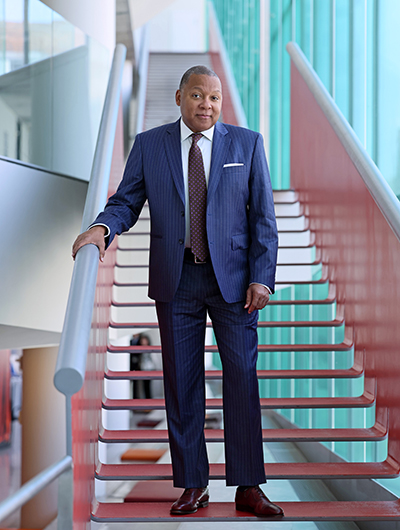Wynton Marsalis

Photo courtesy of the Japan Art Association
Born: October 18, 1961, New Orleans
Wynton Marsalis is a world-renowned trumpeter, bandleader, composer, and a leading advocate of American culture. Marsalis was born to a musical family in New Orleans, Louisiana in 1961. He began performing jazz and classical trumpet music from an early age. In 1980, upon moving to New York to attend The Juilliard School, Marsalis launched his career performing as a member of the legendary Art Blakey and the Jazz Messengers.
In the four decades since, he has rekindled widespread international interest in jazz through performances, educational initiatives, books, curricula, and public advocacy. Between his 1982 debut and the present, Marsalis has released 129 recordings and composed hundreds of original pieces for symphony orchestra, jazz big band and small group, and a variety of chamber music configurations. He has performed in 858 cities and 65 countries across the globe to date.
Marsalis is the recipient of 41 honorary degrees, countless awards, and has been appointed a UN Messenger of Peace (2001). He has been bestowed some of the world’s highest government honors for the arts: The National Medal of Arts (USA, 2005), a Chevalier de la Légion d’honneur (France, 2009), The National Humanities Medal (USA, 2016), and the Praemium Imperiale for Music (Japan, 2023).
Marsalis presently serves as Managing and Artistic Director of Jazz at Lincoln Center, Director of Jazz Studies at the Juilliard School, and President of the Louis Armstrong Educational Foundation. He continues to inspire new generations of musicians and audiences through his performances, recordings, compositions, and educational initiatives.
Blues Symphony
- Composed: 2009
- Premiere: Movement 4: January 14, 2021 by the Atlanta Symphony Orchestra, Robert Spano conducting; complete Blues Symphony: February 4, 2015 by the Shenandoah Conservatory Symphony Orchestra, Jan Wagner conducting. Cristian Măcelaru led The Philadelphia Orchestra in the first recording of the work, released in 2021.
- CSO Notable Performances: These are the CSO’s first performances of this work.
- Instrumentation: 2 flutes, piccolo, 3 oboes (incl. English horn), 3 clarinets (incl. bass clarinet), 3 bassoons (incl. contrabassoon), 4 horns, 3 trumpets, 3 trombones, tuba, anvil, concert bass drum, cabasa, high hat, low tom-tom, ride cymbal, small bass drum, snare drum, suspended cymbals, temple blocks, tubular bells, xylophone, strings
- Duration: approx. 8 minutes
The Blues Symphony is a seven-movement work that gives a symphonic identity to the form and feeling of the blues. It utilizes the language and form of the blues across regions and genres regionally to convey the basic attitude of the blues as music: “Tragic circumstances accepted, better times should be pursued and can always be found.”
This piece is intended to further the legacy of Gershwin, James P. Johnson, Bernstein, John Lewis, and others who were determined to add the innovations of jazz to the vocabulary of the symphonic orchestra. I believe there is an organic and real connection between all Western traditions regardless of instrumentation and that the symphonic orchestra can and will swing, play the blues, and feature melodic improvisation.
For these performances, the Orchestra will play the work’s fourth movement, “Southwestern Shakedown,” which begins with the free call and response of the Devotional opening of the Afro-American Baptist Church. It features instruments high and low in a Sunday morning pastoral moan. This turns into Saturday night with the straight-up dance shuffle. Soaring strings sound the melody that is punctuated by shuffling woodwinds and percussion. The shuffle is our most flexible and enduring American rhythm. It is our version of an African 6/8 clave that all countries in the Americas have interpreted in their own way. We then demonstrate E pluribus unum [which also is represented in the symphony’s first movement] in reverse by investigating different regional takes on this single rhythmic constant from “cowboy” to “train” to “sanctified” to “boogie-woogie” and once again visit the holiness of the American Negro Spiritual briefly before returning to that old locomotive motive. We end with the Charleston rhythm over modern 4/4 swing and, when present, improvising soloists.
—Wynton Marsalis